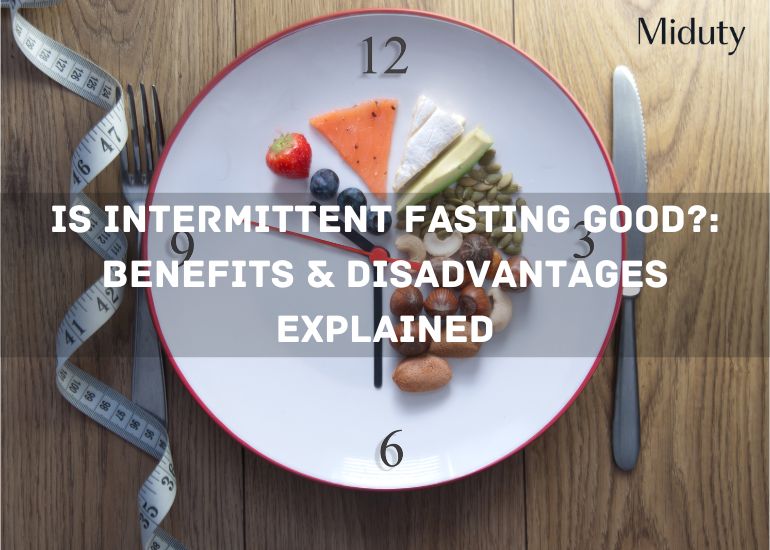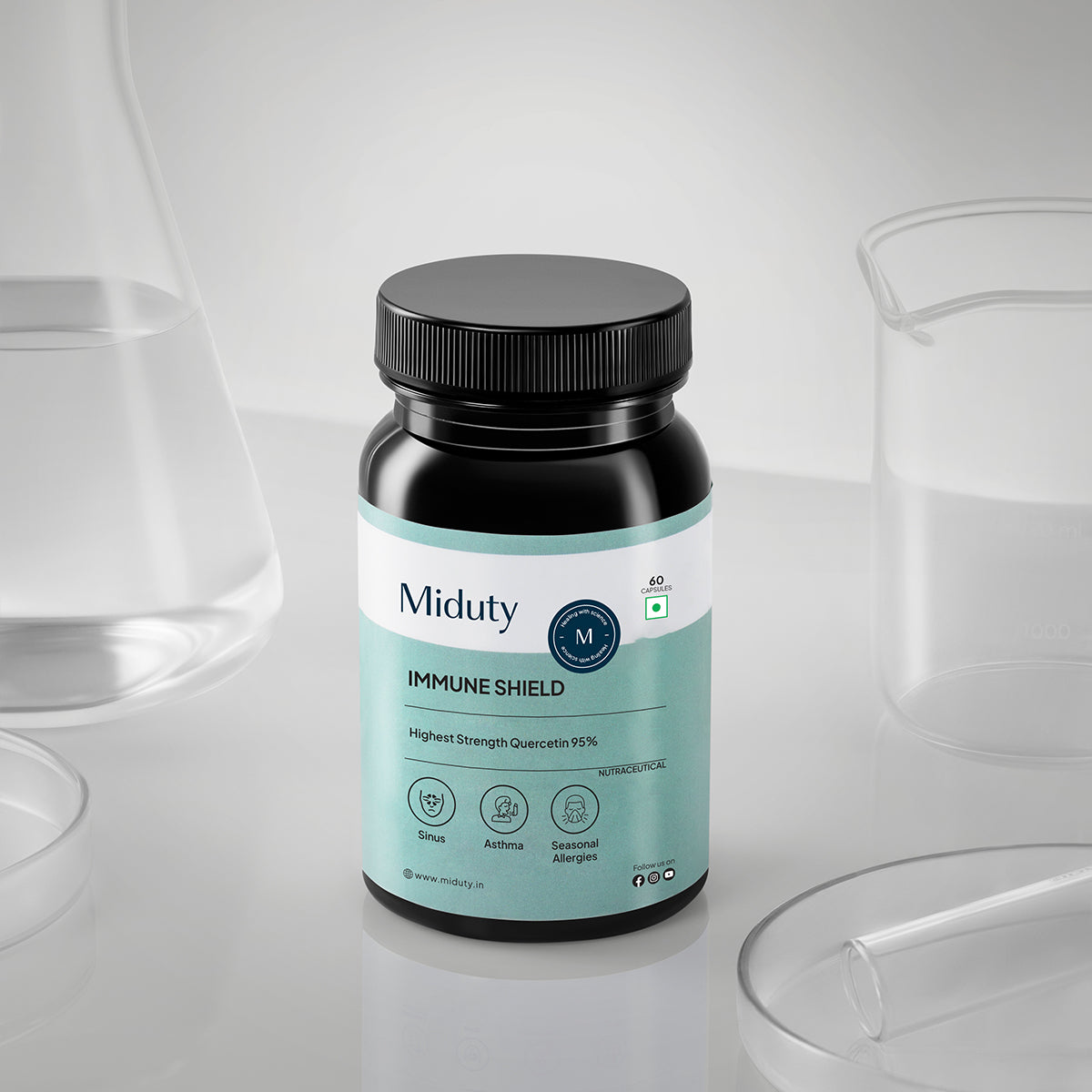
Is Intermittent Fasting Good?: Benefits & Disadvantages Explained
Key Takeaways
1. Flexible Eating Pattern: Intermittent fasting is not a restrictive diet but a flexible eating pattern that alternates between periods of eating and fasting, allowing the body to use fat stores for energy and promoting cellular repair.
2. Diverse Benefits: The practice can enhance metabolism, improve brain function, boost insulin sensitivity, reduce inflammation, and support heart health, making it a comprehensive approach to wellness.
3. Various Methods: Popular methods like the 16/8 approach and the 5:2 method allow individuals to choose a fasting schedule that fits their lifestyle, making it easier to incorporate into daily routines.
4. Cautions to Consider: While beneficial, intermittent fasting can lead to potential drawbacks such as nutrient deficiencies, hunger, and irritability, and may not be suitable for everyone, particularly those with specific health conditions.
5. Tips for Success: To thrive on an intermittent fasting regimen, individuals should start slow, stay hydrated, prioritize nutrient-dense foods, listen to their bodies, and consider combining fasting with exercise for enhanced benefits.
Introduction
In recent years, intermittent fasting has surged into the spotlight as a modern lifestyle choice, becoming the talk of the town in health and wellness circles.
With influencers touting its benefits and friends sharing their success stories, many are intrigued by the buzz surrounding this eating pattern, yet few truly understand what it entails.
At its core, intermittent fasting isn't about strict dieting; it's a flexible approach that alternates between periods of eating and fasting. This method allows your body to switch gears, tapping into fat stores for energy while also promoting cellular repair and improved metabolism.
As we dive deeper into the world of intermittent fasting, we'll explore its principles, benefits, and how you can incorporate it seamlessly into your daily routine!
The Basics of Intermittent Fasting
Intermittent fasting isn't so much a diet as it is a pattern of eating. The idea is simple: you cycle between periods of eating and fasting. This approach allows your body to shift from using glucose for energy to burning fat, which can enhance weight loss and improve metabolic health.
Popular methods include the 16/8 approach, where you fast for 16 hours and eat within an 8-hour window, typically skipping breakfast and enjoying lunch and dinner. Another common method is the 5:2 approach, where you eat normally for five days and restrict calories to about 500-600 on two non-consecutive days.
The flexibility of these methods makes it easier to fit into various lifestyles, whether you have a busy work schedule or prefer leisurely meals. Additionally, many people find that intermittent fasting can help reduce cravings, and fat burning, promote satiety, simplify meal planning, and improve focus during fasting periods, making it a sustainable choice for long-term health.
What are Intermittent Fasting Benefits?

1. Boosted Metabolism and Weight Loss
Intermittent fasting can supercharge your metabolism. When you fast, your body runs out of glycogen (stored carbohydrates) and starts burning fat for energy. This shift, known as ketosis, not only aids in weight loss but also enhances your energy levels. Research has shown that fasting periods can increase your metabolic rate by 3.6% to 14%, which is a significant boost. [1]
2. Enhanced Brain Function
Your brain thrives on efficiency, and intermittent fasting might just be the ticket to mental clarity. Fasting triggers the production of brain-derived neurotrophic factor (BDNF), a protein that supports brain health and cognitive function. Studies suggest that intermittent fasting can enhance memory, improve learning, and even protect against neurodegenerative diseases like Alzheimer's. [2]
3. Improved Insulin Sensitivity
Insulin resistance is a precursor to type 2 diabetes, but intermittent fasting can help combat this issue. By reducing the frequency of meals, your body has a chance to lower insulin levels and improve insulin sensitivity. This can lead to better blood sugar control and a reduced risk of developing diabetes. [3]
4. Reduced Inflammation
Inflammation is at the root of many chronic diseases, from heart disease to arthritis. Intermittent fasting can help reduce inflammation markers in the body. Studies have found that fasting can lower levels of C-reactive protein (CRP), a key indicator of inflammation, thereby supporting overall health and reducing disease risk. [4]
5. Heart Health Boost
Your heart will thank you for embracing intermittent fasting. This eating pattern can lead to lower blood pressure, reduced cholesterol levels, and decreased triglycerides. Research shows that intermittent fasting can be as effective as some medications in improving cardiovascular health, making it a heart-healthy option. [5]
6. Longevity and Aging
Aging gracefully might get a boost from intermittent fasting. Animal studies suggest that fasting can extend lifespan by improving metabolic health and reducing oxidative stress. Although human studies are still ongoing, the promise of longer, healthier years is an attractive benefit of intermittent fasting.
Also Read: Intermittent Fasting 101: A Beginner’s Guide to Getting Started
What are the Disadvantages of Intermittent Fasting?
1. Nutrient Deficiency: Limited eating windows may lead to insufficient intake of essential vitamins and minerals. Consider taking a high-quality multivitamin or electrolyte supplement to ensure you're meeting your nutritional needs during your eating windows.
2. Hunger and Irritability: Extended fasting periods can cause increased hunger, irritability, and difficulty concentrating. Focus on consuming healthy fats such as avocados, nuts, and seeds, along with protein-rich foods like dal, paneer, or eggs during your eating windows to help you feel fuller longer.
3. Social and Lifestyle Challenges: Intermittent fasting might interfere with social meals and activities, complicating daily routines. Plan your fasting schedule around social events, or opt for flexible approaches like the 5:2 method that allows for normal eating on social occasions.
Also Read: 7 Tips on What should be your Intermittent Fasting Diet?
4. Potential for Overeating: There's a risk of overeating during eating windows, which can counteract fasting benefits. Practice mindful eating by slowing down, savoring your meals, and being aware of portion sizes to help prevent overeating.
5. Impact on Exercise: Exercising on an empty stomach may lead to decreased performance or muscle loss. Consider timing your workouts during your eating windows or consuming a small, easily digestible snack like a banana or a handful of nuts before exercising to fuel your performance without breaking your fast.
6. Health Risks: It may not be suitable for individuals with certain health conditions or metabolic disorders. Always consult with a healthcare professional before starting intermittent fasting, especially if you have existing health concerns, to ensure it's a safe option for you.
Tips for a Successful Intermittent Fasting Journey

1. Start Slow
If you're new to intermittent fasting, start with a more manageable approach, like the 12/12 method (12 hours of fasting and 12 hours of eating). Gradually increase the fasting period as your body adjusts. This incremental approach helps to minimize discomfort and eases the transition.
2. Stay Hydrated
Fasting doesn't mean you have to cut out fluids. Staying hydrated is crucial. Water, herbal teas, and black coffee can help you stay full and energized during fasting periods. Proper hydration also supports overall health and helps mitigate any fasting-related headaches or fatigue.
Also Read: Intermittent Fasting: Does It Work or Not?
3. Eat Nutrient-Dense Foods
When you do eat, focus on nutrient-dense foods. Opt for whole grains, lean proteins, soaked nuts and seeds, and leafy green vegetables. These foods provide the essential nutrients your body needs and help keep you satiated throughout the eating window.
Download this free intermittent fasting diet plan for more tips and strategies to help you maximize your fasting experience and achieve your health goals.
4. Listen to Your Body
Intermittent fasting is not a one-size-fits-all solution. Pay attention to how your body responds. If you feel excessively fatigued, irritable, or unwell, it might be worth adjusting your fasting schedule or consulting a healthcare professional.
5. Combine with Exercise
Enhance the benefits of intermittent fasting by incorporating regular exercise. Whether it's cardio, strength training, or yoga, physical activity complements fasting by boosting metabolism, improving mood, and supporting overall fitness.
Also Read: How to Pick the Right Intermittent Fasting Plan and Perfect Your Timing?
Conclusion
Intermittent fasting offers a range of potential health benefits, from weight loss and improved brain function to enhanced metabolic health and reduced inflammation.
While it may not be a cure-all, it's a promising approach for many seeking to improve their overall wellness. As with any health strategy, it's essential to tailor it to your individual needs and listen to your body.
With the right approach, intermittent fasting could be the key to unlocking a healthier, more vibrant you.
Frequently Asked Questions(FAQs) on Intermittent Fasting
Q1. Can I drink water during fasting periods?
Absolutely! Water is not only allowed but encouraged during fasting periods. It helps with hydration and can also help manage hunger.
Q2. Will intermittent fasting affect my muscle mass?
Properly managed, intermittent fasting shouldn't negatively impact muscle mass. Combining fasting with strength training and ensuring adequate protein intake can help maintain muscle while losing fat.
Q3. Can I take medication while fasting?
If you're on medication, consult with your healthcare provider before starting intermittent fasting. Some medications need to be taken with food, and your doctor can provide guidance on how to manage your medication regimen during fasting periods.
Q4. Is intermittent fasting suitable for everyone?
Intermittent fasting can be beneficial for many, but it may not be suitable for everyone. Pregnant or breastfeeding women, individuals with certain medical conditions, or those with a history of eating disorders should consult with a healthcare provider before starting.
Q5. Is intermittent fasting good for health?
Intermittent fasting can offer benefits like weight loss, improved insulin sensitivity, and better metabolic health. However, its effectiveness and safety can vary depending on individual health conditions and lifestyle, so it's best to consult with a healthcare provider before starting.
References













